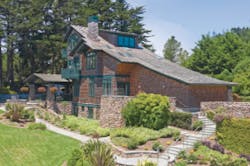Guest Columnist: The Folly of Style in 2021
Amid this culture shift, popular perceptions of architecture often get divided into two camps that are as deaf to each other as MSNBC and Fox News: the fringe worlds of the National Civic Art Society (NCAS) and architecture’s “Deep State” (that is, mainstream architecture schools, journalism, and awards).
Perhaps the culmination of this fracturing of architecture into two camps, Modern and Traditional, is the last-minute effort on Dec. 21, 2020, by the federal administration to define beauty in its executive order promoting “beautiful Federal civic architecture.” The order opines: “It is time to update the policies guiding Federal architecture to ... ensure that architects designing Federal buildings serve their clients, the American people.”
Any number of mainstream architects have drawn the link between this effort and fascism, and any number of traditionalist architects have decried modernism and modernists as literally evil.
These style wars would be sad if the entire debate wasn’t so stupid. “Style” is an outcome, not a motivation, and in architecture, outcomes are the tips of icebergs of effort. To trivialize the motivations of these outcomes based on “style” into either “fascist” or “evil” is inane. Even the results of an October 2020 NCAS-sponsored Harris Poll to assess Americans’ preferred architecture for federal buildings shows about 30% of Americans (a bipartisan selection, at that) prefer Modern (fascist) architecture, while 70% favor Traditional (evil) architecture.
Amidst a sea of sequestering humanity, this tiny comic opera of bellicose projections is completely tone deaf. Architecture may be leaving a century of top-down systemic organization, but that has nothing to do with “style.” After 45 years of making things decried by various magazines, design juries, and potential clients as either traditionally lame or insensitively modern, I can legitimately posit a truth: Beauty is both universally felt and individually perceived, and it has nothing to do with “style.”
Our year of COVID-19 isolation has seen us focus on our homes and lives with unprecedented intimacy. This focus has made understanding motivation far more important than controlling outcomes. But while we may begin to live our values, we are clueless about what the outcomes may be. In that way, 2020 flips the paradigm of outcome-based architecture and focuses us all on the undeniable motivations previously obscured by the noise of our pre-COVID lives. Architecture may be coming to value motivations as criteria for understanding it, versus valuing outcomes as the validation of any particular aesthetic.
The Lincoln Memorial and the black, granite wall of the Vietnam Veterans Memorial sit adjacent to each other in Washington, D.C. In the specious inanity of style wars, one is evil, the other fascist. Yet no one who has seen either memorial actually believes these insults because we know these works’ motivations, despite their exquisitely different outcomes. Humans untouched by either the Civil or Vietnam wars weep in their silent connection. Architecture is that connection, not “style.”
Duo Dickinson is the principal of Duo Dickinson, Architect, in Madison, Conn.

